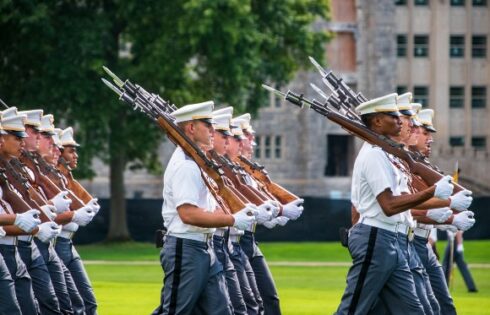
No more unlisted and punitive security fees
Kennesaw State University didn’t have a problem with Ratio Christi and its “dialogue” display until pro-abortion students called the cops on the pro-life student group in 2015.
For subsequent displays, the public university in Georgia forced Ratio Christi to use the “inferior” free speech zone that is required for non-campus groups. In a lawsuit against Kennesaw State earlier this year, the student group called it a muddy patch of grass with “landscaping obstacles” that inhibit conversations with passing students.
Faced with the prospect of a federal judge declaring its actions unconstitutional, the university decided to settle, the students’ lawyers at the Alliance Defending Freedom said Thursday.
Kennesaw State is ditching its free speech zone entirely and allowing speech on all outdoor areas of campus as part of the settlement, according to the alliance. It will pay $20,100 to the students and the alliance for legal expenses.
An alliance spokesperson told The College Fix Friday that it didn’t post the settlement because “the formal agreement is still in the works.” Thursday’s action was just the federal court “administratively” closing the case. It didn’t immediately respond to a question on the fee split, but past published settlements suggest the alliance is getting $20,000 and Ratio Christi, $100.
The former speech zone comprised less than 0.08 percent of campus, and students were banished to the area if officials deemed their proposed activity “controversial.” The university had no guidelines to restrict the whims of officials, allowing them to charge punitive security fees.
MORE: ‘Controversial’ pro-life group sues KSU for banishment to ‘inferior’ space
The settlement bans the university from relegating students to “disfavored areas” when they seek to reserve space, the alliance said, and a new policy “clearly outlines when and how security fees can be charged.”
“In today’s academic environment, Christian students and educators must not only defend our faith, but we must also defend our right to defend our faith,” Ratio Christi President Corey Miller said in a statement released by the alliance.
Two “reservation specialist” officials made content-based decisions in requiring Ratio Christi to move to the stigmatized area required for off-campus groups, according to the suit. Janice Malone told the group to remove “certain” pro-life posters if they wanted their desired spot, and Rachel Patti said “the nature” of their display required its banishment to the muddy patch of grass.
Then-President Samuel Olens, the fifth-highest paid president in the University System of Georgia, even told a Ratio Christi member that the university “would continue to screen student expression” according to its content and relegate some speech to the zone, the suit claimed.
It wasn’t just pro-life speech that bothered Olens, a former attorney general. The first-time university official, who had no previous administrative experience in higher education, kept cheerleaders off the field at a football game a week after some of them knelt during the national anthem.
Shortly after Olens talked to the Ratio Christi member, he was reprimanded by the Board of Regents for the cheerleader restriction, The Atlanta Journal-Constitution reported last fall. He’s now counsel in the law firm Dentons’ public policy practice.
(Ironically, state Rep. Earl Ehrhart – a champion of student speech and due process – suggested in a text message he had helped force Olens to keep the cheerleaders off the field, but later claimed he was just expressing his “personal feelings.” At the time, Ehrhart held the purse strings for public universities as chair of the higher education appropriations subcommittee. He is not running for re-election.)
“We hope that this settlement will prompt other public universities to eliminate similar unconstitutional policies,” Travis Barham, senior counsel to the alliance, said in the statement.
“The First Amendment exists precisely to protect speech that government officials think is controversial,” said his colleague Tyson Langhofer, director of the alliance’s Center for Academic Freedom. Universities should “live by example” in protecting free speech rather than “communicating to an entire generation that the Constitution doesn’t matter.”
MORE: Ehrhart on Olens, cheerleaders: ‘With you and I pushing he had no choice’
IMAGE: mangostock/Shutterstock
Like The College Fix on Facebook / Follow us on Twitter






Please join the conversation about our stories on Facebook, Twitter, Instagram, Reddit, MeWe, Rumble, Gab, Minds and Gettr.